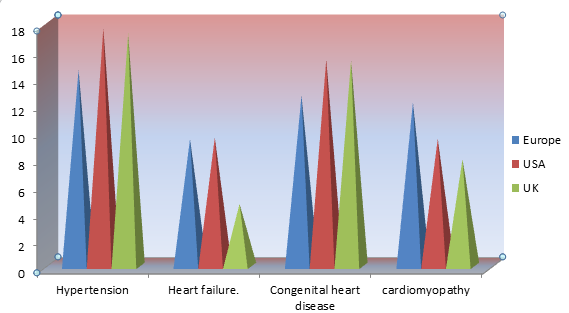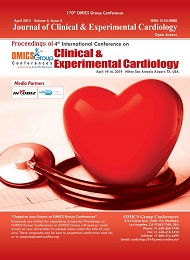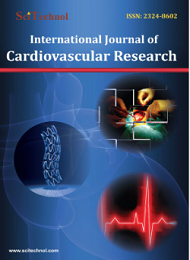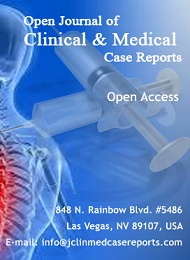Heart disease designates a range of circumstances that affect the heart. Diseases under the heart disease contains blood vessel diseases, such as coronary artery disease; heart rhythm problems (arrhythmias); and heart defects you're born with (congenital heart defects), among others. Heart disease term is often used interconvertible with the cardiovascular disease. It generally refers to conditions that involve constricted or obstructed blood vessels that can lead to a heart failure, chest pain (angina) or stroke. Further heart conditions, such as those that affect your heart's muscle, valves or rhythm, also are considered forms of heart disease. Various forms of heart disease can be prevented or cured with healthy lifestyle choices.
Cerebrovascular disease
Inflammatory heart disease
Hypertensive heart disease
Ischemic heart disease
Rheumatic heart disease
Acute heart failure
Acute heart failure
Diabetes mellitus and cardiovascular diseases
Heart defects
Echocardiography (ECG) is the stratagem for interpretation of the electrical action of the heart over a day and age utilizing anodes set on the skin. These terminuses support in the location of the moment electrical changes on the skin that develop from the electro-physiologic example of heart muscle while depolarizing amid every heartbeat. This record known as electrocardiogram (otherwise called an ECG), gives data about the piece of the heart that triggers every heartbeat (the pacemaker called the sino-atrial hub). For the most part, an ECG is gotten if a heart issue is suspected.
Echocardiography is alluded to as cardiovascular reverberate delivered by the ultrasound waves which thusly make the pictures of the heart. The gadget gets the echoes of the sound waves as they bound with the diverse parts of your heart. These echoes will in general make moving photos of your heart that can be seen on a video screen.
Cardiac-gated imaging techniques
Myocardial perfusion imaging
Cardiac magnetic resonance imaging (MRI)
Three-dimensional echocardiography
Angiocardiography
Cardiopulmonary exercise test (CPET)
Signal-averaged electrocardiogram
Heart rate monitor
Hypertrophic cardiomyopathy
Pacemaker monitoring
Stress echocardiography
Myocardial infarction occurs when the flow of the blood stops to a part of the heart causing damage to the heart muscle. This is usually the result of an obstruction in one or more of the coronary arteries. A blockage can develop due to a build-up of plaque, a substance mostly made of cholesterol, fat, and cellular waste products and the other risk factors are like smoking, obesity, diabetes, alcohol intake, high blood pressure and poor diet etc.
Acute coronary syndrome
Non-ST-elevated myocardial infarction
ST-elevated myocardial infarction
Ventricular aneurysm
Ventricular tachycardia
Blood pressure is the force exerted by the blood against the blood vessels walls, and the magnitude of this force only depends on the cardiac output and the resistance of the blood vessels. The high blood pressure generally does not cause any symptoms however the long term high blood pressure, however, is a major risk factor for stroke, coronary artery disease. Hypertension can strain the heart, damage blood vessels, kidney problems, and increase the risk of stroke, heart attack, and death.
Malignant hypertension
Essential hypertension
Secondary hypertension
Isolated systolic hypertension
Heart failure, occasionally known as congestive heart failure, occurs when your heart muscle doesn't pump blood as well as it should. Certain conditions, such as tapered arteries in your heart (coronary artery disease) or high blood pressure, progressively leave your heart too weak and pump proficiently. Not all conditions that lead to heart failure can be reversed, but treatments can progress the signs and symptoms of heart failure and help you live longer. Lifestyle deviations such as exercising, reducing salt in your diet, managing stress and losing weight can improve your quality of life. One way to inhibit heart failure is to regulator conditions that cause heart failure, such as coronary artery disease, high blood pressure, diabetes or obesity.
Congestive Heart Failure
Diastolic Heart Failure
Systolic Heart Failure
Acute Heart Failure
A computed monograph scan is commonly called a CT scan or CAT scan is a test that uses X-rays to view specific areas of your body. These scans use safe volumes of radiation to generate detailed imageries of the body, which can help the doctor to detect any problems. The test may be called a coronary calcium scan if it’s meant to determine whether there is a build-up of calcium in your heart.
Coronary artery disease (CAD), also called ischemic coronary illness suggests to a gathering of maladies which incorporates stable angina, flimsy angina, myocardial dead tissue, and sudden heart passing. It is inside the assembly of cardiovascular maladies of which it is the most widely acknowledged write. A typical manifestation is chest torment or distress which may go into the shoulder, arm, back, neck, or jaw. Different confusions incorporate heart disappointment or an anomalous pulse.
A cardiovascular gadget is consumed to keep your heart pulsating with a typical beat. There are a few sorts of gadgets accessible. On the off chance that you have heart disappointment with lessened launch division (HF-rEF) and need a gadget. A defibrillator can likewise be named as an existence sparing gadget. Fibrillation occurs when an extensive variety of cells in the heart originate to go about as pacemaker cells. This infers numerous advices the heart to throb, all at different circumstances and with no musicality.
Generally the Heart diseases are distinguished into three basic categories. They are Electrical, Circulatory and Structural disorders. Electrical Disorders are triggered due to the deformities in the electrical system that regulates heartbeat. Circulatory Disorders are usually the disorders accompanying with Blood vessels and mostly they are protective. Causes of these Cardiac Diseases are age, Genetics, High Blood pressure, High LDL level, Obesity, Smoking, and Stress etc.
Arrhythmia
Congenital Heart Disease
Coronary Artery Disease
Dilated Cardiomyopathy
Myocardial Infarction
Ischemic Stroke
Hypertrophic Cardiomyopathy
Aortic Stenosis
Mitral valve Prolapse
When electrical impulses in the heart don't work properly it causes Cardiac arrhythmia.
Symptoms may embrace a wavering in the chest, chest pain, fainting or dizziness.
If required, treatment contains anti-arrhythmic drugs, medical procedures, implantable devices and surgery.
Rheumatic heart disease (RHD) is impairment to one or more heart valves those remnants after an episode of acute rheumatic fever (ARF) is resolute. It is affected by recurrent episodes of ARF, where the heart has become swollen. The heart valves can remain strained and normal blood flow through damaged valves is intermittent. Blood may flow backward through stretched valves that do not close properly, or may be obstructed due to blemished valves not opening appropriately. When the heart is impaired in this way, the heart valves are unable to function effectively, and heart surgery may be required.
Cardiovascular disease (CVD) is a universal term for conditions affecting the heart or blood vessels.
It's usually allied with a build-up of fatty deposits inside the arteries (atherosclerosis) and an augmented hazard of blood clots.
It can also be accompanying with destruction to arteries in organs such as the brain, heart, kidneys and eyes.
CVD is one of the foremost causes of death and disability in the UK, but it can often largely be prevented by leading a healthy lifestyle.
Modern surgery has well-known to such enormousness that the body of acquaintance and technical skills obligatory have led to surgeons stipulating in particular areas, usually a functional area of the body or intermittently in a particular technique or type of patient.
The cardiovascular system contains the heart, blood, and blood vessels (arteries, veins, and capillaries). This compound system is convoluted in a varied number of functions, including:
Transporting blood, proteins, nutrients, O2, CO2, and other molecules
Tissue regeneration and reorganization
Developmental processes
Thermoregulation
Immune response
Wound healing
Cardiac toxicity is impairment to the heart by detrimental chemicals. As part of your treatment, you may be given toxins (drugs) to destroy cancer cells. A side effect is that the normal cells in and around your heart can also be executed. Besides cell death, other types of cardiac toxicity from cancer treatment contain:
Cardiomyopathy
Myocarditis
Pericarditis
Acute coronary syndromes
Congestive heart failure
Cardiovascular Engineering: An International Journal is a publishing forum that promotes innovative methods and technological advancements in the basic sympathetic of the cardiovascular system and in cardiovascular diagnosis and treatment applications. Innovative Assists outline new perceptions and solicitations in cardiovascular mechanics, cardiology applications and diagnostic techniques, cardiac and vascular imaging, devices and instrumentation, hemodynamic monitoring and measurements, cardiac assistance, vascular grafts and artificial hearts, cardiac electrophysiology techniques, computer modelling and drug delivery systems.
Cardiomyopathy is a syndrome of the heart muscle that constructs it harder for your heart to pump blood to the remaining of your body. Cardiomyopathy can lead to heart failure.
Symptoms:
Breathlessness with exertion or even at rest
Swelling of the legs, ankles and feet
Bloating of the abdomen due to fluid build-up
Cough while lying down
Fatigue
Heartbeats that feels rapid, pounding or fluttering
Chest discomfort or pressure
Dizziness, light-headedness and fainting
Peripheral artery disease is also prospective to be a sign of a more widespread accrual of fatty deposits in arteries (atherosclerosis). This condition may be reducing blood flow to your heart and brain, as well as your legs.
Peripheral artery disease signs and symptoms include:
Leg numbness or weakness
Coldness in your lower leg or foot, especially when compared with the other side
Sores on your toes, feet or legs that won't heal
A change in the colour of your legs
Hair loss or slower hair growth on your feet and legs
Slower growth of your toenails
Shiny skin on your legs
No pulse or a weak pulse in your legs or feet
Erectile dysfunction in men
The word cerebrovascular is made up of two parts – "cerebro" which denotes to the large part of the brain, and "vascular" which includes arteries and veins. Organized, the word cerebrovascular denotes to blood flow in the brain. The term cerebrovascular disease consist of all disorders in which an area of the brain is momentarily or perpetually exaggerated by ischemia or bleeding and one or more of the cerebral blood vessels are convoluted in the pathological process. Cerebrovascular disease contains stroke, carotid stenosis, vertebral stenosis and intracranial stenosis, aneurysms, and vascular malformations.
Cerebrovascular Diagnostic Tests
Cerebral angiography
Carotid duplex (also called carotid ultrasound)
Doppler ultrasound
Electroencephalogram (EEG)
Lumbar puncture (spinal tap)
Magnetic Resonance Imaging (MRI)
Magnetic Resonance Angiogram (MRA)
Euro Heart 2019 is a two-day conference which is to be held on October 7-8, 2019, Paris, France. This will be a great policy to gather and share knowledge, presentations, panel discussions, interactive dialogue about the developing world of cardiology. This conference carries together the researchers, scientists, professors, students, cardiologists who allot an international forum on encompassing of approved research.
The organizing committee is equip for an energizing and enlightening assembly program including workshops, symposiums on a wide assortment of points, publication introductions and dissimilar projects for members from over the globe. We cordially invite you to join us at the World Heart Congress, where you will have an amazing experience with all the delegates around the globe. All the members of organizing committee members of Euro Heart 2019 will gaze forward to meet you in Paris, France.
Importance and Scope
Coronary ailments illustrate a scope of conditions that affect your heart. Heart surrenders you're conceived with i.e. inborn heart surrenders, Rheumatic coronary illness, Hypertensive coronary illness, Ischemic coronary illness, Hypertension and numerous more. Coronary angiography was consumed as a part of 85.2% of patients before the interpolation. The Euro Heart Survey (EHS) database has been started entreaty to assumption and cure of cardiovascular ailments in clinical practice. To preserve the rate of cardiovascular (CV) malady, by executing procedures to lessen the weight of CV chance elements and frequency of CV sickness, and create proper models for solid CV lifestyle, this universal instance is a push to locate an option for obtrusive imaging method against heart ailments and heart disappointment conditions in grown-ups and kids.
World Wide:
Academic Medical Centre, Netherlands
Medipol University, Turkey
Netherlands Heart Institute, Netherland
University of Lorraine, France
Yerevan State Medical University, Armenia
Medical University of Graz, Austria
Paracelsus Private Medical University of Salzburg, Austria
University of Groningen, Netherlands
Harvard University, USA
University of Oxford, UK
University of Cambridge, UK
Johns Hopkins University, Maryland
Stanford University, USA
Yale University, USA
University of California, Los Angeles
University of Melbourne, Australia
University of Geneva, Switzerland
University of Bern, Germany
Societies Associated with Cardiology:
The American Heart Association (AHA)
American College of Cardiology
Heart Failure Society of America (HFSA)
American Society of Echocardiography (ASE)
Alliance of Cardiovascular Professionals (ACVP)
American College of Chest Physicians (ACCP)
Some Major Cardiac Research Centres:
K.G. Jebsen Cardiac Research Centre
Heart Failure Research Center
George M. & Linda H. Kaufman Center for Heart Failure
Research Department for Heart Failure
Heart Failure Transplant Research
Baker IDI Heart and Diabetes Institute
Cardiac Center of Excellence
University of Maryland Medical Center
Qatar Cardiovascular Research Center
Global Cardiology Hospitals:
El Camino Hospital
Fortis Memorial Research Institute
Johns Hopkins Hospital
Anadolu Medical Center
Palomar Medical Center
Bumrungrad International Hospital
Mayo Clinic Cancer Center
Clemenceau Medical Center






